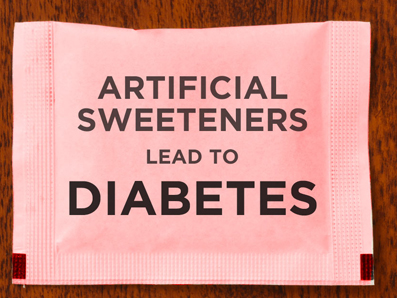
4. Artificial Sweeteners Too Can Contribute to |

![]() It is well known that sugar, consumed in large amounts, increases the risk of a range of health concerns. Excessive sugar intake has been conclusively paired with obesity, diabetes, and cardiovascular disease, and this has, in turn, caused a tremendous increase in the consumption of artificial sweeteners. However, evidence is now mounting that consuming large amounts of these artificial sweeteners could also lead to obesity and metabolic disorders. A recent study has shown that artificial sweeteners also bring in similar ill consequences, but through completely different biochemical pathways.
It is well known that sugar, consumed in large amounts, increases the risk of a range of health concerns. Excessive sugar intake has been conclusively paired with obesity, diabetes, and cardiovascular disease, and this has, in turn, caused a tremendous increase in the consumption of artificial sweeteners. However, evidence is now mounting that consuming large amounts of these artificial sweeteners could also lead to obesity and metabolic disorders. A recent study has shown that artificial sweeteners also bring in similar ill consequences, but through completely different biochemical pathways.
![]() The findings of a most recent study were presented at the Experimental Biology 2018 conference, held in San Diego, by Brian Hoffmann, Ph.D., an assistant professor in the Department of Biomedical Engineering at the Marquette University and Medical College of Wisconsin in Milwaukee.
The findings of a most recent study were presented at the Experimental Biology 2018 conference, held in San Diego, by Brian Hoffmann, Ph.D., an assistant professor in the Department of Biomedical Engineering at the Marquette University and Medical College of Wisconsin in Milwaukee.
![]() The research team wanted to understand how sugar and sweeteners impact the lining of blood vessels — the vascular endothelium — in both cell cultures and rats. So, they focused on two sugars (glucose and fructose) and the zero-calorie sweeteners aspartame and acesulfame potassium. To compare the similarly sweet yet calorifically opposed compounds, they were fed to rats and assessed.
The research team wanted to understand how sugar and sweeteners impact the lining of blood vessels — the vascular endothelium — in both cell cultures and rats. So, they focused on two sugars (glucose and fructose) and the zero-calorie sweeteners aspartame and acesulfame potassium. To compare the similarly sweet yet calorifically opposed compounds, they were fed to rats and assessed.
![]() Interestingly, the experiments revealed that sugar and artificial sweeteners both impaired the way that blood vessels worked, but through entirely different mechanisms of dysfunction. Both sugar and artificial sweeteners produced changes in the levels of fats, amino acids, and other chemicals in the blood.
Interestingly, the experiments revealed that sugar and artificial sweeteners both impaired the way that blood vessels worked, but through entirely different mechanisms of dysfunction. Both sugar and artificial sweeteners produced changes in the levels of fats, amino acids, and other chemicals in the blood.
![]() Results thus indicate that artificial sweeteners change the way the body processes fat and gain energy. In addition, the sweetener acesulfame potassium in particular accumulated in the blood, which at higher concentrations can be harmful to the cells lining the blood vessels.
Results thus indicate that artificial sweeteners change the way the body processes fat and gain energy. In addition, the sweetener acesulfame potassium in particular accumulated in the blood, which at higher concentrations can be harmful to the cells lining the blood vessels.
![]() "We observed that, in moderation, your body has the machinery to handle sugar; it is when the system is overloaded over a long period of time that this machinery breaks down. We also observed that replacing these sugars with non-caloric artificial sweeteners leads to negative changes in fat and energy metabolism. The question we all want answered is "which is safer, sugar or sweeteners?" But, of course, when it comes to our internal chemistry, nothing is that clear cut. As with other dietary components, I like to tell people moderation is the key if one finds it hard to completely cut something out of their diet." says Hoffmann.
"We observed that, in moderation, your body has the machinery to handle sugar; it is when the system is overloaded over a long period of time that this machinery breaks down. We also observed that replacing these sugars with non-caloric artificial sweeteners leads to negative changes in fat and energy metabolism. The question we all want answered is "which is safer, sugar or sweeteners?" But, of course, when it comes to our internal chemistry, nothing is that clear cut. As with other dietary components, I like to tell people moderation is the key if one finds it hard to completely cut something out of their diet." says Hoffmann.
For enquiries info@jothydev.net.
Please visit: jothydev.net | research.jothydev.com | diabscreenkerala.net | jothydev.com/newsletter
